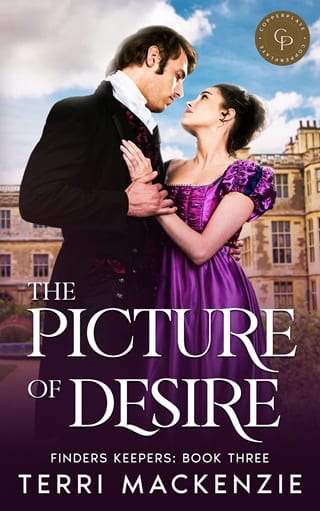Prologue
THE PAST
May 1806
At long past midnight, Ryder Street was near empty. Louisa Picard crossed the road to avoid a few drunkards stumbling along the pavement, their arms around each other as they sang a bawdy drinking song. If they noticed her, they gave no indication, for which she was thankful. Only desperation could have prompted her to make such a dangerous journey across London at this time of night.
She searched for the house she knew to be Henry Beaumont's, keeping to the shadows cast by the wayward moon. There were few around to see her, but even so, she tugged her bonnet down still further to hide her face. The hem of her dress dragged in a puddle, and she scooped her skirts a little higher. This was her first time visiting his home, but she trusted he would see her.
If he did, all would be lost.
Finally, she saw it, and slipped down a side alleyway, rapping on the side door reserved for the servants and deliveries. After a few moments of silence, she knocked again. Then again.
Eventually, a sleepy-looking manservant opened the door, a candle in one hand and a scowl on his face. It deepened when he saw her. "What do you want?"
"I wish to speak to Lord Eynsham."
"His lordship is asleep."
"Then please wake him." She slipped past him and down the narrow corridor that she could only assume led to the main portion of the house. "Tell him Miss Picard is here to see him," she said over her shoulder. "He will receive me."
At least that was something she was confident of.
The servant glowered at her, but she had already escaped into the hallway, and stood with her arms wrapped around herself, looking around the dark house. It was small and shabby, and although she had not been to many bachelors' houses, she suspected most were more salubrious.
"Remain where you are," the servant said, and ascended the stairs with a flickering candle in one hand.
"I have nowhere else to go," she said. The aptness of the words sent a shiver through her. She held her cloak more firmly around herself and tried to think past the fog of hopelessness that had settled over her since her disastrous dinner with Lord Bolton.
Henry would help. He had to. If he did not, all would be lost.
It felt as though hours passed before light made its way back down the stairs, this time accompanied by Henry. He was wearing a robe loosely tied around his waist, and when he approached, she noticed that his eyes were sleepy yet fierce, as though he would defend her against the ills of the world.
Her hope rose, and her heart gave a childish leap. Relief bloomed. She would be all right now.
"Louisa," he said, holding out his hands. She put hers in them at once. "What brings you here at this time of night?"
"I need your help," she told him. "I'm sorry for waking you, but there was nothing for it."
"How did you escape?"
She gave him a contemptuous look. "I climbed out of my window."
The hint of a smile touched a dimple in one cheek, and he ran a hand through his messy hair. "Of course you did. What is the matter that couldn't wait until the morning?"
"It would be too late by then."
"What happened , Louisa?"
"Bolton," she said, and his expression tightened.
"He offered for you?"
"Not so directly." She snorted and moved away, needing the space in which to organise her thoughts. "He arranged the whole with my mother, and has gone as far as procuring a special licence. We are to be married tomorrow."
A muscle twitched in his cheek. "Tomorrow?"
"Mama will not listen to reason. She thinks that his wealth is the only thing that matters, never mind that he—" She broke off at the angry glint in Henry's eyes. Probably best that he didn't know the way Bolton had ogled her as though she were fresh meat, a new delectable flavour he intended to sample. "Well, I have tried pleading with her to no avail, and you may be sure that she fully intends to drag me to the altar if I do not go willingly."
A frown tightened his handsome, autocratic face. "In a month, you will reach your majority and be free to marry whomever you choose. If you can—"
"She will not allow me to wait. You must help me, Henry."
Her words seemed to settle into the very fabric of the house, sinking into silence until the darkened shadows of the hallway seemed to quiver with distress. The first stab of true panic went through her, cold and cruel.
All this time, she believed he would help. Could help. He was a gentleman in his own right, an adult. A man. If he could not help, what else could she do?
"Have you spoken with him?" he asked. "Perhaps you could—"
"He would not listen to reason."
"But if—"
"No. I have thought it all through. We shall have to go to Gretna Green."
He swallowed, hard, and she felt it as though he had slapped her. "Louisa," he said, and his voice cracked. "Gretna Green?"
"What other choice do we have?"
He shook his head. "That isn't a choice," he said jerkily. "Surely you understand—how would we get there?"
"You would hire a carriage, of course. A chaise and four." Anything, so long as she could escape this marriage. "You have to help me, Henry. You promised we would be married when I was of age."
He stiffened as though she had been the one to strike him now, a flush coming to his cheeks, dark in the gloom. "And I meant it. But I do not have the funds to flee across the country, Louisa. Surely you know—when I said marry, I meant properly, a small wedding in a small church. The Banns read."
"We could travel post," she said, desperate now.
"We could," he said slowly. "But I have no funds for accommodation along the way. And Bolton—if we travelled post, he would be able to find us without trouble. He'd catch us, and then things would be so much worse for you." He caught her hand, squeezing it with the same desperation she felt. "I don't have his influence or his wealth or his reach. He is an earl, and a rich one, and I have nothing . I have no way to take you to Gretna Green, and if I were to keep you away somewhere—to hide you —until you came of age, we would both be ruined. Gentlemen do not compromise ladies of quality."
Tears, terrible and uncontrolled, rose to the back of her nose. "So you would rather I married another?"
"No, of course not!" He reared back and paced the hallway, hands combing through his hair as though he needed something to do with them. "But what would you have me do? You come here expecting the impossible—if I could I would, but where would I get the money in time? You are to be married tomorrow: I could go to a moneylender, but it would be too late. And my father—" He gave a bitter, angry laugh. "Perhaps he has the money, but heaven knows he would not give it to me, even to marry the woman I love."
"You could apply to him," she whispered.
"Ever since your father's death," he said gently, "I have known how incapable I am of providing for your mother. Or even for you. My family's disapproval I could weather, but what of yours?"
"I need nothing more than you." Her hands shook as she clasped them in front of her. "Please, Henry. I would bear it all, all manner of poverty and want, if you would bear it with me."
"I would if I could, but how?" There was real agony in his voice; he had not stopped pacing until now, when at the other end of the dimly lit hallway he turned to face her. "What would you have me do, Louisa?"
"Anything," she whispered, "so long as I do not have to marry him."
"Perhaps . . ." The words were an effort. "Perhaps Bolton is a better choice given your current straitened circumstances. He can provide for you, he wants to marry you—perhaps it won't be a love match, but you will have everything you need, and your mother will be well provided for."
She stepped back. "You can't mean that."
Shafted moonlight through a tiny window above the front door illuminated the devastation on his face. This was her Henry Beaumont, the man whom she had loved for two years, and he was letting her go.
She could not accept that there was no other solution. Where there was love, and will, there was always another way.
"I would marry you if I had more than a pair of shillings to my name," he said, voice edged with frustration. "As it is, I could hardly afford to pay for a wedding. And if there were not your mother to think of, I would risk it anyway. But there is, and we both know that she expects your husband to support her." He dragged an exhausted hand down his face. "Something I cannot do in my present circumstances."
"So you would rather I marry Bolton?"
"I would rather neither of us were in this situation, and I'd rather have more than an instant to make a decision for the rest of our life. But ever since your father's death, I've known how incapable I am of providing for your mother in my current position. Perhaps it would be wise to marry someone whose financial situation is not plagued by debt and uncertainty." His hand fell to his side. "That person is not me, Louisa. Not right now. I wish it were. If I could wrangle control of the estate from my father, I would, but the eyes of the law do not support it, and neither does he. So short of ruining us both, what am I to do?"
He had not seen the way Bolton looked at her and addressed her; he did not know that although it seemed a good match, it would be insupportable. She did not know how to tell him. Not when she had already pleaded for his help, and he had denied her.
She took a step away from him. Away, away. A direction she never thought she'd choose. The anguish settled into her skin, knifelike and vicious. "Then we have nothing more to say to one another. I won't embarrass either of us by begging."
"Don't go like this," he said, and it sounded remarkably as though he was the one to beg. "Please, Louisa. There must be something ."
She fastened the ribbons of her bonnet more firmly around her chin. "Goodbye, Henry."
Though it seemed as though he wished to stop her leaving, he did not, and she exited the house as silently as she had entered it. For a moment, she considered not returning home, but a destitute girl on the streets was not long for this world.
When she reached her mother's small house, she only hesitated an instant before climbing back up to her bedroom window. The room beyond was cold and dark, and she shivered as she changed into her nightgown and slipped between the chilly sheets.
She did not cry.
 Fullepub
Fullepub 



